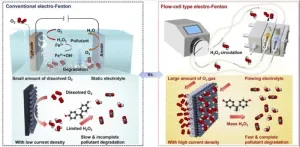(Press-News.org) A little of what you fancy does you good… unless it’s a fizzy drink. Scientists studying the impact of sugar on the risk of cardiovascular disease have found that eating too much added sugar increases your risk of stroke or aneurysm, but eating a few treats is associated with a lower risk of cardiovascular diseases. Meanwhile, drinking sweetened beverages raises your risk of stroke, heart failure, and atrial fibrillation.
“The most striking finding from our study is the divergent relationship between different sources of added sugar and cardiovascular disease risk,” said Suzanne Janzi, PhD candidate at Lund University and corresponding author of the article in Frontiers in Public Health. “This surprising contrast highlights the importance of considering not just the amount of sugar consumed, but its source and context.”
A spoonful of sugar
Although most public health bodies recommend limiting sugar consumption to protect your teeth and improve your diet, there has previously been limited evidence regarding the impact of sugar intake on cardiovascular diseases. These diseases are the leading cause of death and disease in Europe, and changing your diet is a comparatively easy way to reduce your risk.
To understand how sugar consumption affects cardiovascular disease risk, and whether consuming different kinds of sugar changes those risks, the scientists collected data from two major cohort studies, the Swedish Mammography Cohort and the Cohort of Swedish Men. These studies had diet questionnaires administered in 1997 and 2009, allowing the scientists to monitor participants’ diets over time.
Once exclusions had been made to ensure the two cohorts shared the same inclusion criteria and to remove independent risk factors for cardiovascular diseases, the scientists were left with a sample of 69,705 participants. They looked at three classes of sugar consumption — toppings like honey, treats like a pastry, or sweetened beverages like fizzy drinks — and seven cardiovascular diseases: two different types of stroke, heart attacks, heart failure, aortic aneurysms, atrial fibrillation, and aortic stenosis.
The participants were monitored until they died, were diagnosed with one of the cardiovascular diseases, or reached the end of the follow-up period in 2019. During this period, 25,739 participants were diagnosed with a cardiovascular disease.
The scientists then used this data to break down how the different types of sugar intake affect the risk of different cardiovascular diseases.
Affairs of the heart
They found that consuming sweet drinks was worse for your health than any other form of sugar: drinking more sweetened drinks significantly increased the risk of ischemic stroke, heart failure, atrial fibrillation and abdominal aortic aneurysm.
“Liquid sugars, found in sweetened beverages, typically provide less satiety than solid forms — they make you feel less full — potentially leading to overconsumption,” said Janzi. “Context also matters — treats are often enjoyed in social settings or special occasions, while sweetened beverages might be consumed more regularly.”
Different cardiovascular diseases were affected differently by increased sugar intake, possibly because consuming additional sugar affected participants’ individual risk profile differently. Increased sugar in general raised the risk of ischemic stroke and abdominal aortic aneurysm, as well as increasing the risk of heart failure in participants with a normal BMI.
However, the highest risks of a negative health outcome arose in the lowest intake category for treats. Consuming occasional treats was associated with better outcomes than no treats at all.
“This might reflect underlying dietary behaviors — individuals consuming very little sugar might have very restrictive diets or might be limiting sugar due to pre-existing health conditions,” suggested Janzi. “While our observational study cannot establish causation, these findings suggest that extremely low sugar intake may not be necessary or beneficial for cardiovascular health.”
However, the scientists noted that more work will be needed to understand the mechanisms involved in the differential effects of different types of sugar consumption. They also pointed out that diet is highly demographically and culturally specific.
“Our findings are based on a Swedish population, which may have dietary habits and lifestyle factors that differ from those in other populations,” said Janzi. “Particularly relevant in this context is the social custom of ‘fika’ — regular coffee and pastry breaks that are deeply embedded in Swedish culture. These results may not directly translate to other populations with different dietary cultures.”
END
Sugary drinks significantly raise cardiovascular disease risk, but occasional sweet treats don’t, scientists find
A large-scale study in Sweden suggests that drinking sweetened drinks significantly increases your risk of serious cardiovascular disease, but limited consumption of treats doesn’t
2024-12-09
ELSE PRESS RELEASES FROM THIS DATE:
Falsifying anthropics
2024-12-09
In short:
“We exist, therefore the universe is made to host us”: the anthropic principle has sparked intense debate in cosmology since its first formulation. A new paper published in JCAP proposes a way to test it. To falsify it, all three of the following conditions must be confirmed by observations:
• Cosmic inflation occurred
• Axions exist
• Dark matter is not made of axions
If all these conditions are proven true, the anthropic principle would lose its validity, and our universe would appear ...
New West Health-Gallup poll reveals most Americans worried about often hidden healthcare fees
2024-12-09
WASHINGTON, DC – Monday, December 9, 2024 – More than half of Americans (52%) worry about affording the cost of often hidden healthcare fees, increasingly pervasive charges that could add hundreds or even thousands of dollars to their medical bills a new West Health-Gallup poll finds.
Hospitals typically add these fees on top of charges for routine medical services like lab tests or physical examinations provided at outpatient centers, clinics, and medical offices that they own. This means patients end up paying more for the same medical service than they would at independent providers or freestanding clinics – and some may not even ...
Developing wastewater treatment units that treat right where it's generated
2024-12-09
Conventional wastewater treatment involves the centralized collection of wastewater from sources through pipes to large-scale treatment plants, where it is treated in bulk. However, this is not feasible in small, decentralized areas such as rural areas. Simple treatment units installed at small non-point sources of pollution mainly focus on disinfection and turbidity improvement, and do not properly decompose the recalcitrant organic matter in wastewater. In addition, even if industrial wastewater is treated in-house, the treatment efficiency is low, and highly ...
Children’s Hospital of Philadelphia researchers find rotavirus vaccine is safe for use in NICU babies
2024-12-09
Philadelphia, December 9, 2024 – Researchers from Children’s Hospital of Philadelphia (CHOP) found that transmission of rotavirus vaccine strains in a neonatal intensive care unit (NICU) is rare and without clinical consequences, strongly suggesting that giving the rotavirus vaccine to eligible infants during their hospitalization provides immune benefits that outweigh any risks. The findings, published today in the journal Pediatrics, could serve as the basis for a change in clinical practice.
Rotavirus is a virus that infects the lining of the intestines and is typically ...
New international guidelines announced for Premature Ovarian Insufficiency (POI)
2024-12-09
New guidelines on the diagnosis and management of premature ovarian insufficiency (POI) – developed by the Centre for Research Excellence in Women’s Health in Reproductive Life (CRE-WHiRL) at Monash University, and key international women’s health organisations with an international team of experts including women with lived experience – will be published today (TBC) simultaneously in three leading journals.
POI is defined as loss of ovarian function before 40 years. This is much earlier than the usual age of menopause; occurring at an average age of 48-51 years in women globally.
POI affects approximately 4 per cent ...
Supporting parents through “unimaginable pain” of losing child – new toolkit developed for clinicians involved in Child Death Review
2024-12-08
Parents who face the heartbreaking loss of their child should get a specific keyworker to support them through bereavement, wherever they are in the country, according to a set of recommendations informed by new research.
In an academic paper published in Archives of Disease in Childhood today, bereaved parents and academic experts from the University of Birmingham, University of Bristol and Birmingham Community Healthcare NHS Foundation Trust have outlined their recommendations for support that all bereaved parents ...
Could online technology be a clue as to why boys in Norway are outperforming girls in learning English as a second language?
2024-12-08
Bucking conventionality, boys in Norway are making early gains in reading English as a second language and even outperforming girls at age 10 and 13 – a new a study of more than one million students suggests.
Publishing their findings in the peer-reviewed journal Assessment in Education: Principles, Policy & Practice, experts from the University of Oslo propose the perhaps unexpected results might be explained by online gaming and experiences with other digital technologies such as YouTube – with English being the language of the internet.
“Our ...
A healthy diet helps the weighty battle with chronic pain
2024-12-08
Chronic pain is an acute and debilitating condition that affects millions of people worldwide. And while pain interventions are available, many people struggle without treatment at all.
Now new research from the University of South Australia shows that adopting a healthy diet can reduce the severity of chronic pain, presenting an easy and accessible way for sufferers to better manage their condition.
Exploring associations between body fat, diet, and pain, researchers found that a greater consumption of foods within the Australian Dietary Guidelines was directly associated with lower levels of body ...
ASH 2024: Antibody shows encouraging results for treating high-risk follicular lymphoma and marginal zone lymphoma
2024-12-08
MIAMI, FLORIDA (STRICTLY EMBARGOED UNTIL DEC. 8, 2024, AT 12 NOON EST) – Two clinical trials testing the antibody loncastuximab tesirine (Zynlonta) showed encouraging results in patients with high-risk forms of two blood cancers – follicular lymphoma and marginal zone lymphoma. The findings, led by physician-scientists at Sylvester Comprehensive Cancer Center, part of the University of Miami Miller School of Medicine, will be presented at the American Society of Hematology’s 2024 meeting in San Diego.
One study, a phase 2 clinical trial led by Juan Alderuccio, M.D., ...
Observation of new electric field signals strong potential for assorted devices: new research at City University of Hong Kong
2024-12-08
HONG KONG (8 December 2024)—A new vortex electric field with the potential to enhance future electronic, magnetic and optical devices has been observed by researchers from City University of Hong Kong (CityUHK) and local partners.
The research, published in Science, is highly valuable as it can upgrade the operation of many devices, including strengthening memory stability and computing speed. With further research, the discovery of the vortex electric field can even later impact the fields of quantum computing, spintronics, and nanotechnology.
“Previously, generating a vortex electric field required expensive thin film deposition techniques and complex procedures. However, our ...
LAST 30 PRESS RELEASES:
Antarctica sits above Earth’s strongest “gravity hole.” Now we know how it got that way
Haircare products made with botanicals protects strands, adds shine
Enhanced pulmonary nodule detection and classification using artificial intelligence on LIDC-IDRI data
Using NBA, study finds that pay differences among top performers can erode cooperation
Korea University, Stanford University, and IESGA launch Water Sustainability Index to combat ESG greenwashing
Molecular glue discovery: large scale instead of lucky strike
Insulin resistance predictor highlights cancer connection
Explaining next-generation solar cells
Slippery ions create a smoother path to blue energy
Magnetic resonance imaging opens the door to better treatments for underdiagnosed atypical Parkinsonisms
National poll finds gaps in community preparedness for teen cardiac emergencies
One strategy to block both drug-resistant bacteria and influenza: new broad-spectrum infection prevention approach validated
Survey: 3 in 4 skip physical therapy homework, stunting progress
College students who spend hours on social media are more likely to be lonely – national US study
Evidence behind intermittent fasting for weight loss fails to match hype
How AI tools like DeepSeek are transforming emotional and mental health care of Chinese youth
Study finds link between sugary drinks and anxiety in young people
Scientists show how to predict world’s deadly scorpion hotspots
ASU researchers to lead AAAS panel on water insecurity in the United States
ASU professor Anne Stone to present at AAAS Conference in Phoenix on ancient origins of modern disease
Proposals for exploring viruses and skin as the next experimental quantum frontiers share US$30,000 science award
ASU researchers showcase scalable tech solutions for older adults living alone with cognitive decline at AAAS 2026
Scientists identify smooth regional trends in fruit fly survival strategies
Antipathy toward snakes? Your parents likely talked you into that at an early age
Sylvester Cancer Tip Sheet for Feb. 2026
Online exposure to medical misinformation concentrated among older adults
Telehealth improves access to genetic services for adult survivors of childhood cancers
Outdated mortality benchmarks risk missing early signs of famine and delay recognizing mass starvation
Newly discovered bacterium converts carbon dioxide into chemicals using electricity
Flipping and reversing mini-proteins could improve disease treatment
[Press-News.org] Sugary drinks significantly raise cardiovascular disease risk, but occasional sweet treats don’t, scientists findA large-scale study in Sweden suggests that drinking sweetened drinks significantly increases your risk of serious cardiovascular disease, but limited consumption of treats doesn’t


